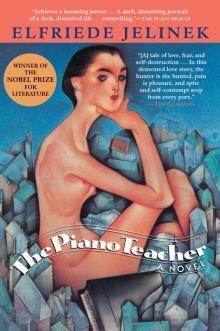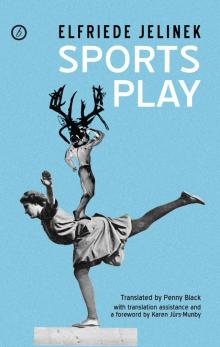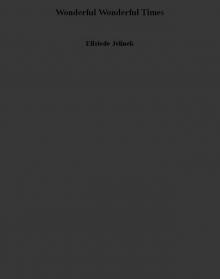- Home
- Elfriede Jelinek
Wonderful Wonderful Times Page 2
Wonderful Wonderful Times Read online
Page 2
Mother hums one of those melancholy songs by Koschat, which always have a birch seat in them. She is thinking of a field of wheat and a walk in the country, things that you're reluctant to expect a one-legged man to take on, it's hard to ask it of him, he'd only spoil the mood from the very start anyway. Father is thinking of a different field, the field of honour where he didn't fall. Now he keeps a careful watch on the field of family honour, by way of compensation. So his wife, the sow, doesn't have it off with men who are not disabled. You can't keep an eye on her all the time, and what does she do at the grocer's when she goes there?
Frau Witkowski says it's often necessary to have a break. Herr Witkowski says he'll break something of hers in a minute, and throws something hard that hits her shoulder and makes her start. She'll have a bruise there. Ready yet, you whore? Look, it's not too much to ask, now is it? Else I'll knock you down with my crutches. At one time I would have thrown myself on you but now it's out of the question, a man with one leg can't throw himself anywhere (or he'll have problems getting up again). It's like a fish. A fish hasn't got any legs at all but it can swim and dive gracefully. So I'm a perfect photographer. Now get your legs apart!
My hobby photographer's eye tells me that you've not washed your hair. Again. I ordered you to wash your hair. It's supposed to look silky and not like some straggly thornbush. You do nothing but get in the way of my personal fulfilment. I get my fulfilment from nude photography. Whenever you block off my forays into the realm of photography I could bash your skull in.
But I don't block off your forays into the realm of photography, not at all, Otti.
ANNA DESPISES TWO classes of people: first, those who own their own homes and have cars and families, and second, everybody else. Constantly she is on the verge of exploding. With rage. A pool of pure red. The pool is filled with speechlessness that talks away at her nonstop. In her there is nothing whatsoever of a lass with a perm or a bobbing pony-tail listening to a hit in a record store and restlessly tapping her foot because the rhythm gets to her. Everybody but her is on the ice, the smooth, endless ice, and Anna kicks and shoves them in turn as she goes along. Right out to the very edge, which you cannot see but which it's to be hoped is there so that they can all be swept into the deathly-cold water. What she talks about with her brother is of a philosophical or literary nature, but what speaks from within her alone is the language of the sounds produced by the piano.
On a school trip once, the girls in her class took a photo where they were all giving a double-page pic of Peter Kraus in Bravo magazine a kiss. Eight laughing faces, all going mmmm-mmmm with their lips pursed to kiss and smiling into the camera. Anna was the only one who wouldn't purse her lips, and they jeered at her. The real derision followed soon after, when one of the girls said to Anni: Hey, Anni, get in here quick, they've got Bach on the Wurlitzer, sounds like your kind of thing. And dimwit Anna, stupid with sun, blinded by her music studies and rendered a social defective by a crazy mother, dashed in as fast as she could go, wanting her own music that nobody but her would understand and which she could explain. But what was playing on the jukebox? A hit by Elvis, Tuttifrutti, which you have to reject for educational reasons, let alone anything else. The girls rolled about on the cafe floor, their stupid schoolmate Anna imagined you'd get Bach on a Wurlitzer and not what youngsters love.
That is the kind of twisted schoolkid Anna is. Anna, who spends her spare time playing the piano.
In Anna's case it tends to be a sweeping-up job, like a street-cleaning machine. In Rainer's it is more like a flight of steps consisting of living human beings, with the young author standing on the topmost step, picked out by a light, reading out one of his own poems, a poem that embraces the whole of mankind and is mythic in character.
Apart from literature (which anyone who can speak is a master of, none more nor less than another, but which certain people have monopolised, people who can't afford a superior method to elevate them out of their surroundings), Rainer has unfortunately not managed to conquer anything else yet. But literature is well able to meet Rainer's demands.
Whenever (contrary to all expectation) the twins are invited to some wild party, they promptly say no, we don't associate with people like that, that kind of fun is stupid and pointless. But they only say it because they can't dance and can't stand not being better at something than other people. Renunciation is rarely easy for Youth, but Age finds it less of a problem since it has already been practising renunciation the whole time.
Rainer says you can take possession of a person. First of all you have to know more than he does, and then he will recognise your expert status. Hans, for instance, the young worker met at the jazz club. Rainer will explain everything to him, till he is nothing but a tool without a will of his own; this is more difficult than fashioning a literary text, since people are capable of putting up surprising resistance. Which is tiring. But it stretches you.
Art is flexible and tremendously forbearing. People are occasionally refractory, but they are receptive to explanations. Of course they think they know better anyway, but Rainer really does know better.
The kids who go to school with him are a grey flock of lambs, ignorant and immature. They say what they did with girls at the weekend, in the basements (converted for partying) of their parental homes, in their own rooms in comfortable apartments at Hietzing, in the woods while looking for mushrooms, or in a changing cubicle at the swimming baths. The girls say what they allowed to be done to them or how they refused to do it and how the boys begged. But they were adamant because they Want To Stay A Virgin. Everything that's said is a cue for something else. Rainer, have you never done it with a girl? At least when they're talking about intimate subjects like this they don't call him 'Professor' the way they usually do. Rainer promptly explains that lust is a species of ecstasy. (????) You see, in this state of ecstasy, consciousness is merely the consciousness of the body, and therefore a reflexive consciousness of physicality. As in the case of physical pain, in lust there is a kind of reflex which ensures that one is very intensely aware of one's lust. (Huh? I don't get it.)
Anna states that for that reason lust is the death of desire, because it is not only the consummation of desire but also its goal and thus its end. People go in pursuit of lust, yet it remains totally meaningless.
The class desert the show, saying: These two professors don't know what they're talking about. They've never copped hold of a cunt or a prick in their lives.
Sophie Pachhofen goes gazelling about the rooms that pong of chalk, hunting in her purse for money to buy the notorious roll for break and a Coke. Envious, Anna hides her thick wedge of bread and dripping; Mummy spread it for her and put her whole heart into it because Anna is her favourite child (she is a woman, like herself), Rainer is more of a Daddy's boy. Love of Sophie hits Rainer like a karate chop in the neck, and he says to this girl whom he secretly adores: The carnal presence of the other is increasingly lost from sight to the consciousness, which ingurgitates our own carnality instead, this being its ultimate objective. So now you know, Sophie. One must act accordingly.
Rainer digs a fingernail into the palm of his hand. He is so terribly keen to have Sophie. She herself wants it just as badly. She simply won't admit it to herself.
Rainer informs Sophie that he is the beast of prey and she is the prey. Sophie says, I don't get it, what's all this about. Do you fancy coming to play tennis some time? Rainer says he only ever plays on his own court. Sophie's gaze strays beyond him. Rainer says she should take it to heart: the desire to caress becomes the desire to be caressed. One wants to feel one's body blossoming, to the point of nausea. Has Sophie (he speculates) ever felt that? If not, he'll show her what's meant.
Sophie leaves.
Everything gives me the creeps, especially today, says Anna.
As soon as Sophie returns from the grocer's with the salami roll, Rainer will order her to hand it over to him. It will be a trial of wills. There she comes now. Experimentall
y, adopting a brutal expression, Rainer places a number of fingers on Sophie's jugular. Ouch, are you crazy, there's a whole lot of nerves in the neck that you can kill off unintentionally. Who said anything about unintentionally, says Rainer. I saw it in a French film.
You don't go killing people just because you saw it in a film.
Who knows what I'm capable of, says Rainer. All I know is that I'm capable of inconceivable cruelty and keep a firm grip on myself so that I don't really behave that way.
Anna is lurking in the background, lying in wait for half a roll that's going free. I brought you one too, says Sophie, offering it. With fish and onions, how you like it. Great!
As soon as Anna has gobbled her half roll she goes out to the toilet and sticks a finger down her throat. Out they come again, the fish and onions, yurgh, only in reverse order. Anna contemplates what she has thrown up, then pulls the flush. She feels as if she consisted entirely of filth. No wonder. After all, she unceasingly brings the filth with her from home, like a magnet.
Once, when she was still a child, she watched Mummy in the bathtub. Contrary to her usual bathtime practice, Mother was wearing an old pair of white panties, which billowed out like a sail in the water. There were red stains on them. Revolting. A body such as that is simply an appendage to a person, and one that easily spoils. It isn't the main thing. Even though there is a lot you can buy to put inside the body or drape on it. Whenever Anna sees something white she promptly wants to stain it.
Anna's thoughts turn constantly and compulsively to unpleasant things that slip past the checkpoint in her brain. It's one-way traffic: the barrier's raised to let things in but doesn't let them out. That brain of hers is crammed with unpleasantness, and the emergency exit is nailed shut. Take (for instance) the humiliating memory of how a number of mothers complained about her to the teacher some years ago. Anna's sexuality had been issuing from her lips in the form of gross jokes (just as Rainer's sexuality too is only ever a matter for the mouth). Supposedly Anna's jokes had poisoned the childlike souls of various classmates. That was when Anna's difficulties in speaking first began. More and more often her tongue would say no, I'm not doing anything today.
Right now Anna is once again making stains. What she'd like best would be to see Sophie's surface area grubbied about like this. But it is made of the finest repellent material: the material repels dirt.
Another little example. Anna is fourteen years old. She is sitting naked on the floor, legs apart, trying to deflower herself with the aid of an old shaving mirror and a razor blade, to rid herself of a membrane that is supposedly down there. But she knows nothing about anatomy and cuts into her perinaeum by mistake. Which bleeds fearfully.
When Anna emerges into the open from the reeking school toilet, naturally it's snow-white Sophie who whirls past her first, burying her. Sophie the avalanche. Want to stop by at my place this afternoon? Okay.
Anna pumps away energetically and keeps it up for a long time, but there is no blood (as there was that time back then), no ink, no raspberry juice and no vomit.
Sophie slips nimbly past her and heads outside. Into the light. Where it is so light that Sophie no longer stands out, and disappears without trace.
HANS SEPP'S father was in the labour movement, and was killed at Mauthausen concentration camp. As if it had never witnessed such things, the light of the setting sun breaks brightly upon the Kochgasse windows, burning with a greater intensity than it has on leaving the sun. You have to close your blinded eyes for protection against the violence of Nature. The people who live here have experience in turning a blind eye to things.
Across the road there is a little shop selling knitting and sewing equipment. Brightly-coloured yarns and wools on little crocheted doilies; the pointed needles are inside the store. Touched by the things of everyday life, Hans the natural creature enters the council block where he lives with his mother. Obdurately he looks right through the old lady and her daughter (both of them wearing black work smocks); they are serving ladies who do handicraft work at home. Hans's mother does work at home too. In their untidy home she addresses envelopes. It's paid work, mind you.
There is also something natural about the potatoes and oranges and bananas at the greengrocer's. Anna and Rainer would be certain to compare these things with something they know from the artificial, man-made world of poetry, thinks Hans arrogantly. Nature is much more vitally present to me. I have my finger on the pulse of the age. I let things come and go, in and out of me. In Laudongasse the number 5 tram sets up an almost continuous squealing, approaching the stop by the baker's. I'm not yet spoilt by art and literature, thinks Hans.
His mother also gazes into the reflection of the setting sun. As she does so, her head and heart are occupied with social democracy, which has often been a disappointment to her. If there are many more disappointments she will try the Communists. Where did you get that pullover, Hans? That cashmere wool is a class or two higher than what our budget will run to. Mother sets fire to a thread and can tell from the stench that it's real wool. Hans (returning home from the Elin Union, the firm where he is being trained to be an electrician) promptly informs her that he was given the pullover by his friend Sophie, whose parents are rich. He is still the man and she the woman. And things are going to stay that way. He'll see to that. If you go on like that you'll betray the cause of the workers without realising you're doing it, says Mother. Hans goes into the kitchen, the only room that is heated, and pours a glass of milk so that he will still be able to go in for a lot of sport. He sleeps in a tiny closet, Mother in the cold living room. Screw the working class, long live rock 'n' roll. It's the class you belong to. Not for much longer, if I can help it, I'm going to be a gym teacher or maybe something even better, who knows.
At that moment a fresh swarm of workers pour out of the number 5 that has just arrived, into the side streets. Stale and fuggy stairwells suddenly come alive. The mothers of families dive for apartment doors to welcome their breadwinners home. They snatch their shabby briefcases, battered cooking utensils and thermos flasks away from them; or (in the case of Superior People) relieve them of attache cases plus newspapers, remnants of Superior People's trout, greasy paper, etc. And the homecomers change into the down-at-heel socks they wear at home and which until recently they were still wearing to work. These people know what having to scrimp and save is like, even if they don't all need to. You can't always go buying something new if you still have the old thing. The first clips have been administered to children's ears and their ill-treated voices are uplifted in shrill chorus. No, Karli can't go out again today, I said no. Round the corner, in Beserl Park, dogs go for a leisurely prowl in the grass, and crap a little here and there. War invalids, who at one time were out and about in the streets, watch them with interest, thinking of the time when they were still somebody, on enemy territory in a foreign land, somebody they no longer are.
They crack the leads like whips, which makes no impression on the dogs. No one obeys the one-time soldiers any more, nor do they have anyone whose every word they can themselves obey. Authority is unfortunately a thing of the past.
Hans gobbles up several rounds of bread and margarine and checks his quiff in the old shaving mirror which supposedly belonged to his murdered father. Don't get started on your concentration camp stories again, I've had them up to here.
Across the road, the woman who keeps the knitware shop lets the blind half down. Behind it, bending forward, is a customer, still talking about a new pattern. The era of embroidered pictures on every wall is just dawning and will soon be in full swing. Scarcely have people acquired the hard-won bare essentials than they are already starting to think of the unnecessary luxuries. It'd be best if they didn't even trouble to ponder the necessities of life. If you don't have the cash you get your sunshine from things you don't really need. Or else the daily grind is grey.
You haven't been to the group evenings for four weeks. They could use you just now to stick posters up (Mother to Ha
ns). Piss off (Hans to Mother). She treats him to a long quotation from a book, dry as paper.
Till well into the fifties, the situation of the working people was even worse than at the time of the great economic crisis in 1937. This period is considered part of the notorious post-War phase. Productivity was increased, which was tantamount to aggravating exploitation, but at the same time food was in distinctly short supply. At the time when the action of this novel takes place, though, everyone is already much better off and the way is clear for a wirtschaftswunder (a German notion familiar from numerous films featuring kidney-shaped fifties tables and cocktail cabinets, and from numerous blondes with big busts propped aloft in wired C-cups). Everyone hails it with loud cheers of welcome. There are always some people, though, in whom the way is never clear for anything, let alone wonders. They keep on opening their doors, but all that comes in is the cold from outside. Frau Sepp is one of these unfortunates.
In faltering tones she tells her son about that decisive year, 1950, for the umpteenth time. It gets on his nerves. In 1950 she said goodbye to her next-to-last hopes. (Today's emphasis is on Olah's drunken bands bursting into factories, beating, butting and thumping, forcing the strikers to resume work. Olah, commander of the strikebreaking posse, is in the SPO National Assembly, and so on and so forth, blah blah blah.) Frau Sepp overlooks one point: that her son, in inverse proportion to her own hopes, has for some time been nurturing false hopes, hopes which he himself believes to be realistic. Hans is a young, healthy fellow and relies on his fists, just as those Social Democrat officials Probst, Koci and Wrba relied on theirs when they crushed the strikes. Hans has learnt that you don't have to be an official of the beloved workers' party to bash things down, there's a more straightforward way of doing it, and (above all) you can do it solely for yourself. At some point you'll start accumulating a fortune, a fortune which will go on getting bigger and bigger.

 The Piano Teacher
The Piano Teacher Sports Play
Sports Play Lust
Lust Greed
Greed Wonderful Wonderful Times
Wonderful Wonderful Times